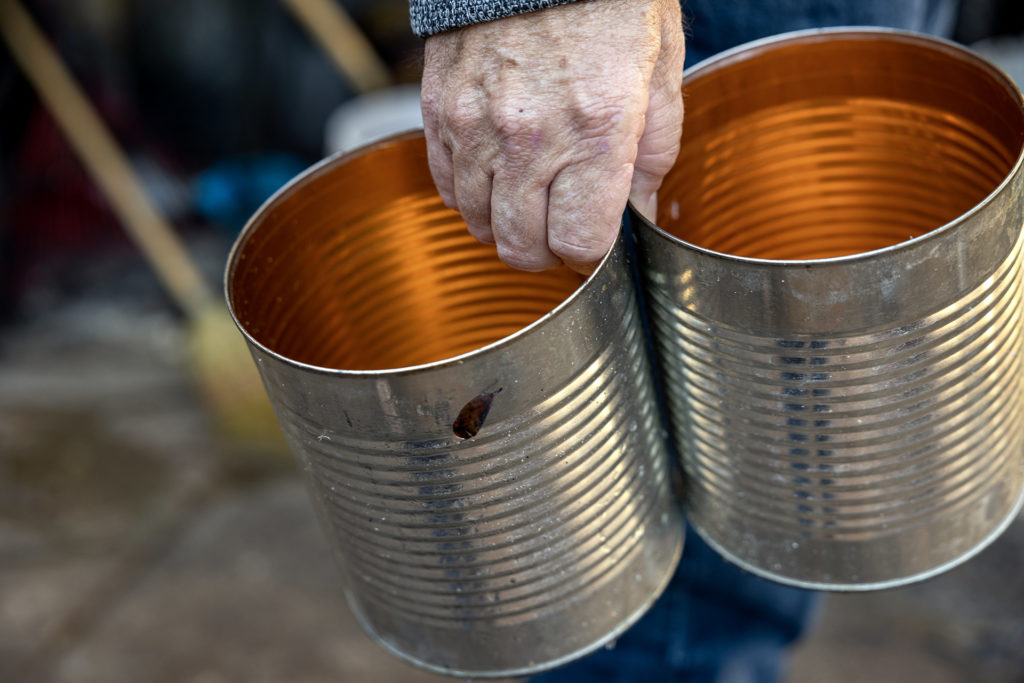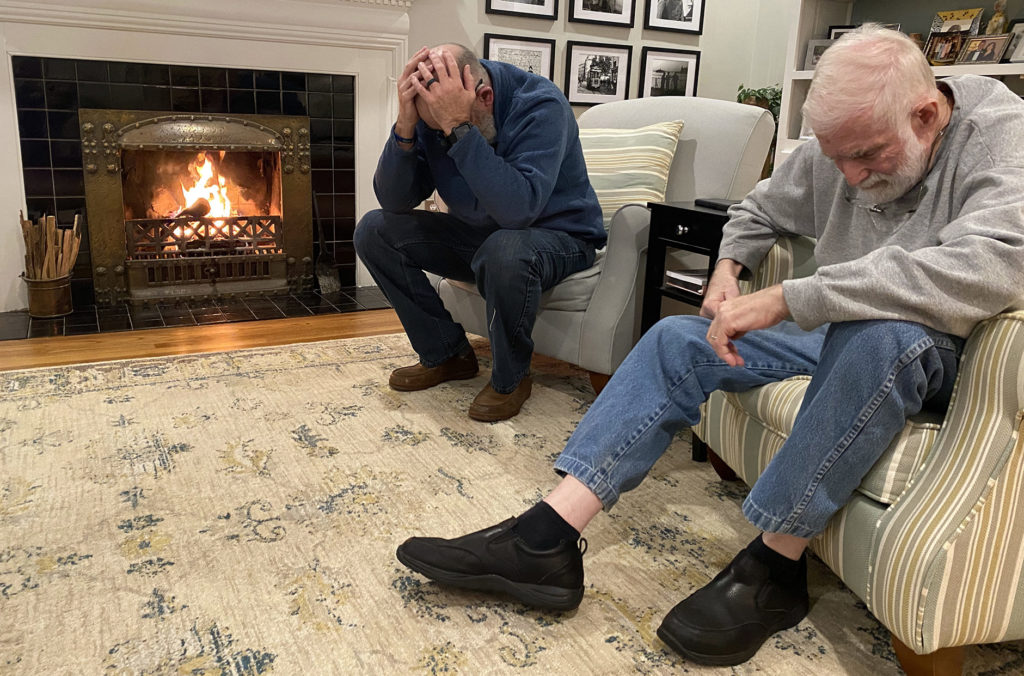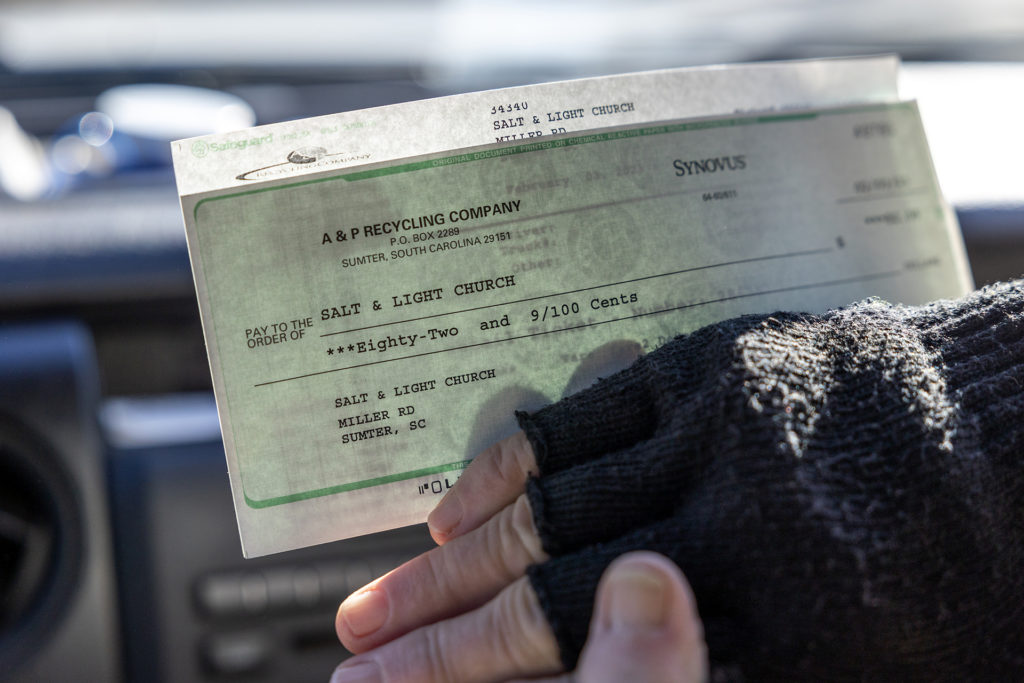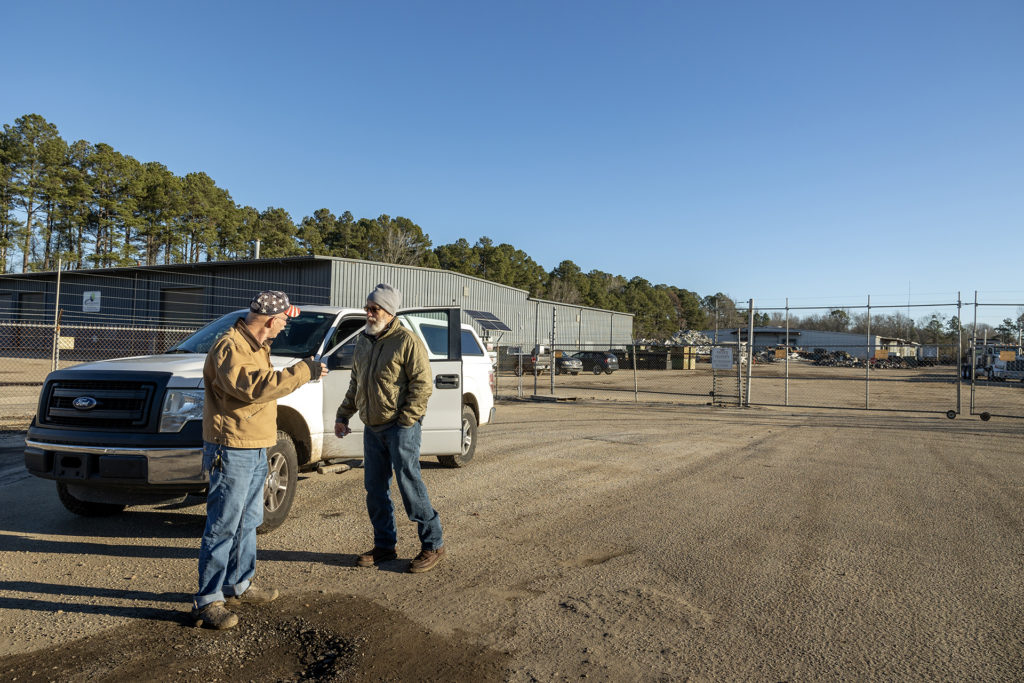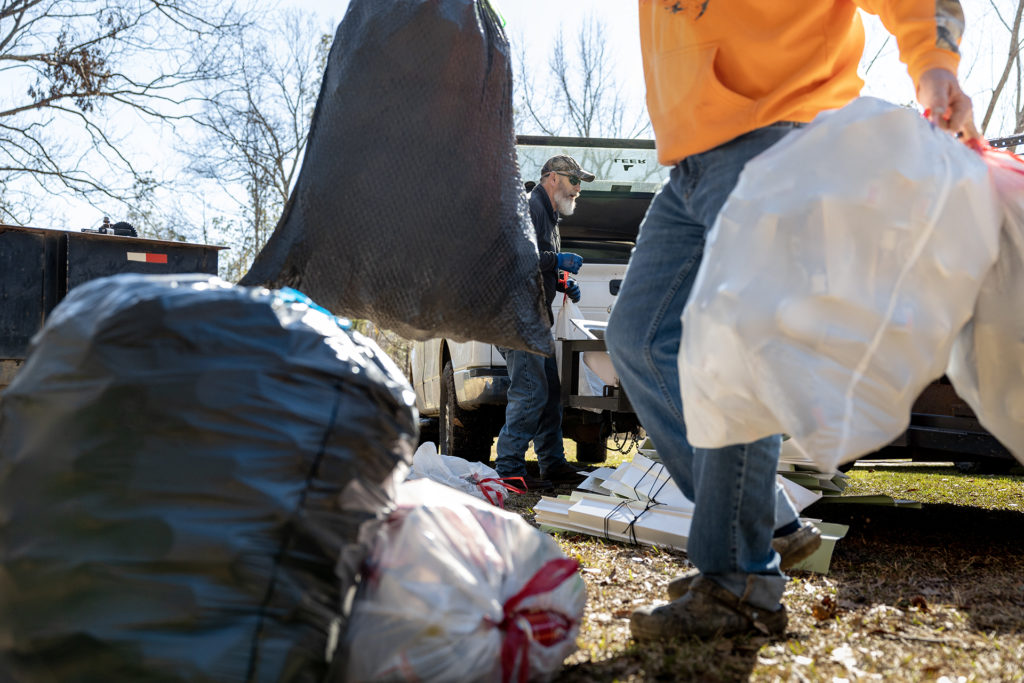
Rodney Howard, center, teaching pastor at Salt and Light Church, Sumter, S.C. gathers bags of metal cans, broken appliances and scrap metal along with the help of Jerry Burke, a retired post office carrier. IMB Photo
The 80-year-old man crawls halfway into the green trash bin, feet barely touching the ground. He rummages through discarded bags. Not hearing the familiar jingle of tin and aluminum cans, Dave Joslin pulls his head out and motions for his dog to move on.
“I never intended to be a bag lady,” the retired postal worker jokes as he shuffles down the sidewalk in his Sumter, South Carolina, neighborhood. “But when God gives you a mission, like turning trash into cash, you do it.
“I might not be able to share the gospel in far-off places,” Joslin continues, “but I can make sure someone else can through my Lottie Moon offering.”
Joslin and his fellow members at Salt and Light Church boost their annual offering to international missions in a unique way — recycling. This year they raised more than $21,000.
One man challenged his church to get creative with their Lottie Moon Christmas Offering. IMB Video
The idea to collect scrap metal surfaced more than a decade ago when the 45-member church set a Lottie Moon Christmas Offering® goal of $4,000. Joslin wasn’t satisfied. He knew the annual offering went 100% to missionaries sharing the gospel in the least-reached places of the world. So, he countered with $10,000. The small congregation turned to him in surprise.
Joslin flashed a mischievous grin and asked, “Where’s your faith?”
Questioning someone’s faith can be fighting words in the South, even more so in a Celebrate Recovery church like Salt and Light. The 12-step addiction recovery program prioritizes placing addictions in Christ’s care. Stepping out in faith isn’t a weekly or even a daily topic here; it’s second-by-second until eternity.
In a congregation where the recovery program and its values are woven into the church’s DNA, the idea of scrapping metal for missions hits at its very core. Turning recyclable scraps into a way to spread the gospel is a picture that parallels the transformation of people as they surrender their lives and wills over to the care and control of Christ.
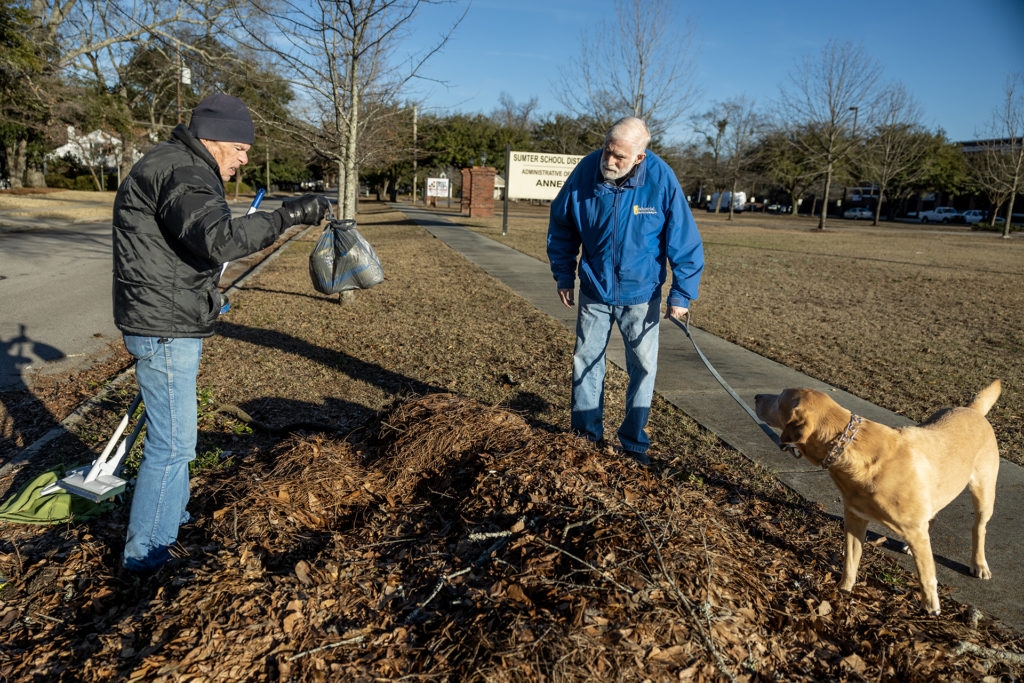
Top left photo: Rodney Howard, pastor at Salt and Light Church, prays with church elder, Dave Joslin. Top right photo: The price of metal varies from pennies on the dollar to nearing $15 per pound. It just depends on the type of metal. Bottom photo: Bill Lee, joins neighbor and friend, Dave Joslin, to pick up scrap metal found on their walk. Joslin had the idea of collecting and scrapping metal in the community to add to their church’s Lottie Moon Christmas Offering. He got his friend, Lee, to help from the beginning. IMB Photo
Even with this vision, money is something the church never emphasizes. Making ends meet can be difficult when piecing lives back together and working on recovery. Others are retired and live on fixed incomes. This didn’t deter Joslin. He knew they could raise the funds by putting in a little work recycling.
“I know times are tough, but everyone has trash,” he encouraged.
Trash to Cash
Ten years later, recycling for missions is instilled deep in the church’s identity. So much so that members joke about their compulsion to stop in the middle of the road to grab a can or cruise neighborhoods looking for discarded appliances. For them, the Lottie offering emphasis is year-round, not just in November and December.
It’s not uncommon to find volunteers working on a sunny February afternoon. Pastor Rodney Howard and Jerry Burke, church member, sort different types of metal into piles behind the pastor’s house. Some local businesses and animal rescue homes donate their cans each week. Others in the community call the church to pick up an appliance to strip or harvest metal from condemned properties. One time the city of Sumter donated chain-linked fences.
“People know that we do this and they want to be a part of it,” Howard says, emphasizing this effort is larger than their church now.
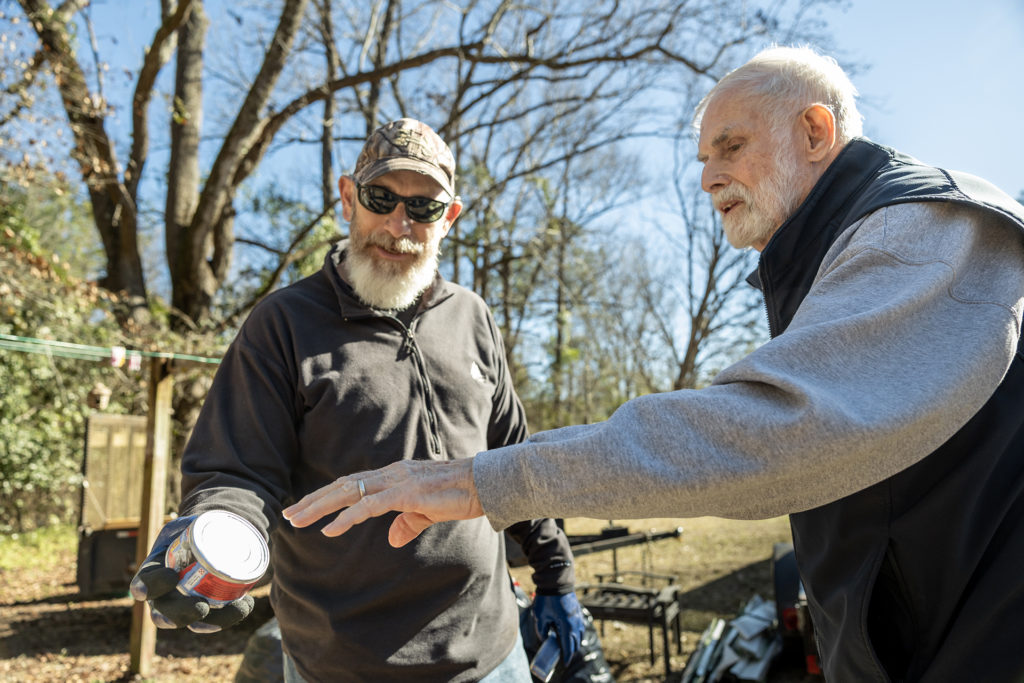
Rodney Howard holds a metal cat food can as Dave Joslin discusses the different types of metals and how to decipher which it could be. Joslin has been recycling for cash for years and can tell by weight how much money it might bring. IMB Photo
Sorting the metals to get the best price is smelly and tedious work. Howard scrunches up his nose when he gets a whiff of soured cat food. When he stumbles on a muddy object in a bag, the pastor pulls out a big magnet to test for metal. Joslin shuffles over from where he supervises the two younger men in their 60s. He pulls apart magnetic reading glasses to do his own test. It sticks. He nods, and Howard tosses it in the recycle bin while Burke loads the trailer.
The men put everything from a washing machine, sink, aluminum siding and cans to strings of wire and car batteries on the trailer. Then, they guess how much this haul will bring before heading to the recycling center. One estimates $45; another $42.
“Sometimes all the work you put into this for such a small amount doesn’t seem worth it,” Howard admits. He holds up an $82 check from the day’s haul and adds, “We did pretty good today, but what can $82 really do?”
- The latest haul of scrap metal brought in $82.09 for Salt and Light Church’s Lottie Moon offering. The church has grown their offering through scrapping metal all year long in Sumter, S.C. IMB Photo
- Jerry Burke, church member, and Rodney Howard, pastor, discuss the process of scrapping metal outside the A&P Recycling Company, Sumter, S.C. The entire church helps with the recycling ministry. IMB Photo
Howard gives a knowing smile as he launches into his favorite points about supporting missions. Though small, today’s haul might purchase 40 Bibles in Ukrainian or buy two audio players for missionaries to use for digital evangelism. It might even be used to print 82 gospel tracts in a different language and transform someone’s life.
“When we take load after load each week, it adds up over the course of a year,” the pastor explains. “Then, when our $20,000 is added to what other Southern Baptist churches give [to Lottie Moon], we can send missionaries and support a gospel movement.
“This is how a small church like ours can have a global kingdom impact.”
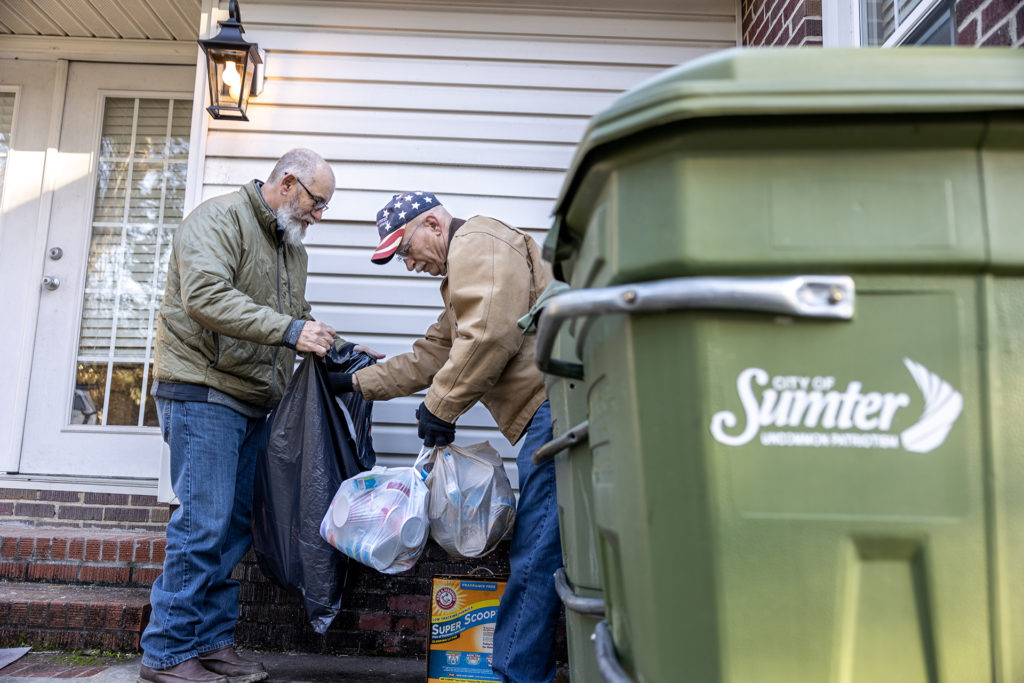
Some businesses in the Sumter, S.C. community donate their cans to the Salt and Light Church’s Lottie Moon Christmas Offering. Rodney Howard helps Jerry Burke pick up metal cat food cans from one of the local rescue houses. IMB Photo
Called to Give
Joslin brags like a proud father about those who stepped up to lead this ministry during his recent battle with cancer. Like most people he recruited through the years to help, Burke prefers staying in the background. For years he collected cans and cut cords off discarded electronics after work. Now, the new retiree drives around Sumter to pick up cans at businesses and helps sort the metals before taking them to the recycling center.
“I may not be called to stand on the street corner and preach but I have been called. I’m doing the Lord’s work here,” Burke says, raising the cans still in his hands. “This is my little way of helping spread the Word all over the world.”
This is why Joslin challenged the church so many years ago to step out in faith. It was never about the offering goal, even though they met it. All he ever wanted was for God to creatively use Salt and Light Church.
When Joslin looks at his church, he doesn’t see people recovering or struggling through hard times. He sees compassionate believers who know exactly what it means to receive help and support. He sees people who step out in faith, no matter how hard the work might be.
He sees a church “called to give.”
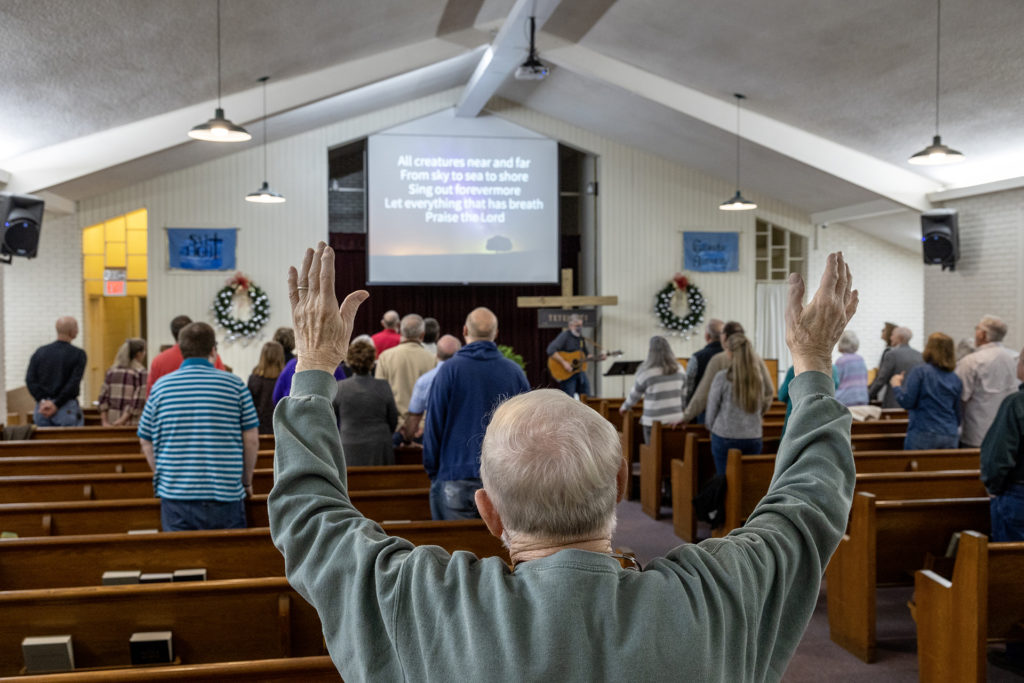
Dave Joslin, Salt and Light church elder, worships alongside approximately 50 church members. The small church feels called to be a church that “gives” so others may share the gospel in the least-reached places of the world. IMB Photo


